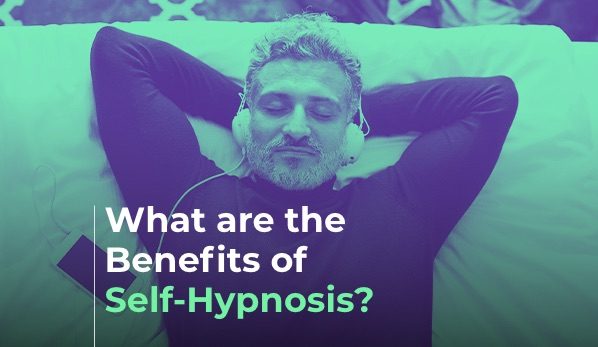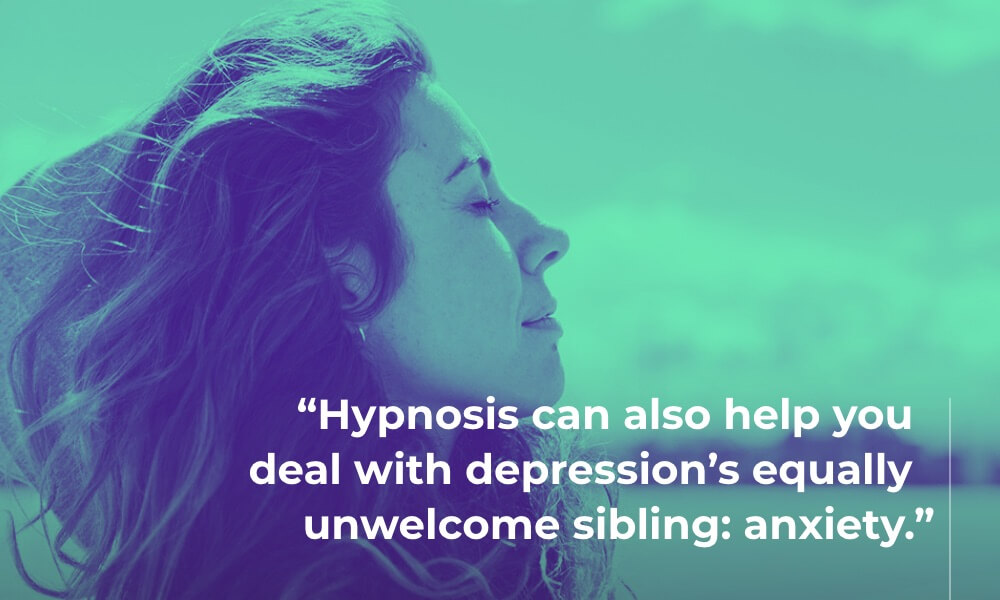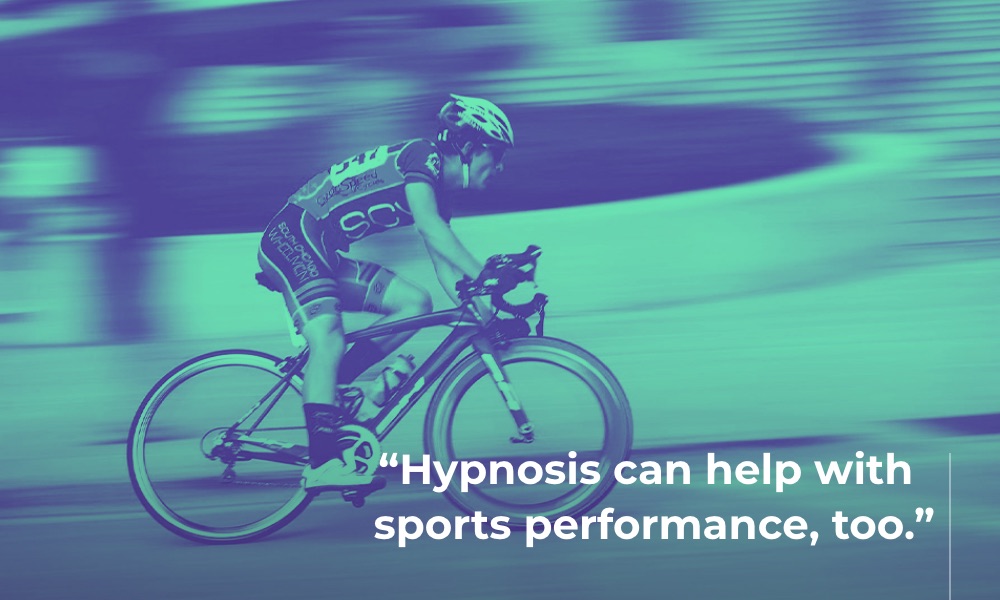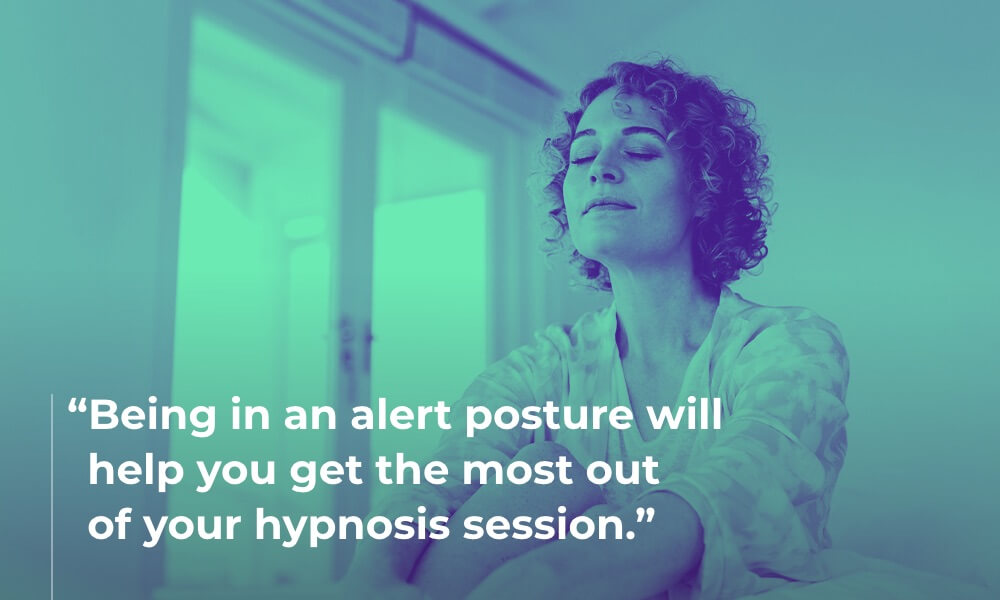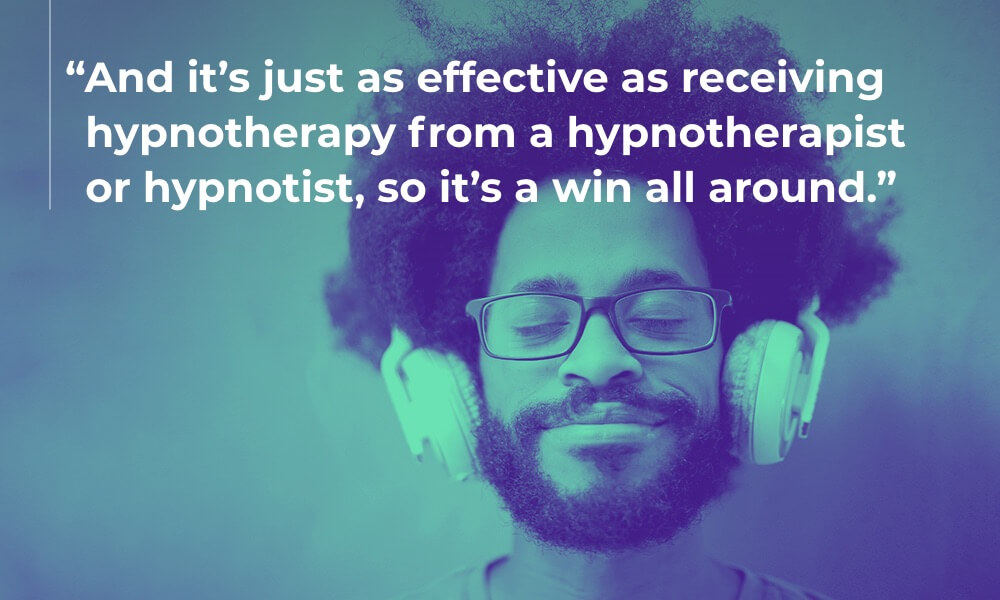Self-hypnosis has many benefits. It can improve both your body and your mind. Self-hypnosis can help you do everything from quit smoking to lose weight. It can also help you build your confidence, interact better with your loved ones, and improve your performance at your favorite sport.
If you’re ready to start reaping the benefits of self-hypnosis today, you’re in the right place! In this article, we share the many more ways that self-hypnosis can help you succeed. We also explain the difference between self-hypnosis and meditation, and we help you decipher which one to use when. Finally, we give you some tips on how and when to practice self-hypnosis. Let’s get started!
What is Self-Hypnosis?
Hypnosis is a method by which you’re safely guided into a trance-like state where you’re more open to helpful suggestions. The helpful suggestions you hear when you’re in this state help you reach your goals. (To learn more, check out our in-depth explanation of hypnosis.)
Self-hypnosis occurs when you perform hypnosis on yourself (often using an app or another form of guidance) rather than having a hypnotist or hypnotherapist perform hypnosis on you.
It’s just as effective as “conventional” hypnosis, and it has many benefits that conventional hypnosis does not have. For example, you can do self-hypnosis from the comfort of your own home. And self-hypnosis is much more cost-effective than the price of conventional hypnotherapy (and often for free). You can also do self-hypnosis on your own schedule and as frequently as you want to.
Self-Hypnosis Benefits: Common Health Issues
Whether it’s anxiety or chronic pain, depression or irritable bowel syndrome, your mind’s interpretation of whatever health condition you have affects your experience of it. So, hypnosis can help change your interpretation of the issue, shifting your experience of the health condition.
Mental Health Conditions
Self-hypnosis can help with a wide array of mental health issues. For instance, hypnosis is scientifically proven to help address depression. A meta-analysis of studies found that hypnosis improved depression symptoms for 76% of participants.
Hypnosis can also help you deal with depression’s equally unwelcome sibling: anxiety. It’s proven to help with all kinds of anxiety, whether general and “free-floating,” or attached to a specific thing: like fear about medical procedures. In fact, a review of six different studies found that hypnosis positively changes anxiety traits.
Physical Health Conditions
Self-hypnosis improves physical health issues as well. For example, acute or chronic pain management. A meta-analysis of 18 studies found that a whopping 75% of participants experienced “substantial pain relief” after trying hypnosis. These were people who suffered from various forms of pain, and an overwhelming majority found relief with hypnosis.
If you’re having trouble falling asleep or staying asleep at night, hypnosis can help here, too. Hypnosis works whether you’re suffering from sleep disorders or simply can’t sleep because you’re too stressed out. A systematic review of studies found that nearly 70% reported some sleep benefits from hypnosis, with 58.3% citing an immediate improvement in sleep.
And if you’re one of the roughly 15% of Americans who suffer from irritable bowel syndrome (IBS), hypnosis may benefit you too. One study found that 71% of IBS patients noticed a decrease in symptoms with hypnotherapy. And of those, 81% enjoyed long-term improvement.
Hypnosis can help other health issues too. If you’re interested in seeing if it may be right for your health condition, speak with your doctor or health care professional. They’ll be able to give you the medical advice you need.
Self-Hypnosis Benefits: Thoughts and Behaviors
The benefits of self-hypnosis extend beyond just your mental and physical health. Hypnosis reaches deep into your subconscious mind to help you change your thoughts and behaviors at the core level. Because of this fact, it can help you with everything from gaining more confidence and improving your performance at work to stopping that pesky nail-biting habit. Let’s take a look at a few specific examples of what self-hypnosis can do.
Losing Weight
If you’re looking to slim down, you may want to look to self-hypnosis before trying an expensive diet plan or weight loss surgery. Hypnosis can help you get to the root cause of issues that may be causing weight gain—like overeating—and change your behavior. One study found that participants who lost weight using hypnotherapy kept the weight off longer than participants who lost weight without hypnotherapy.
Overcoming Phobias
The use of hypnosis has also been found to help work through fears. For example, self-hypnosis can help conquer phobias, like the fear of public speaking or dogs. And this is backed by science! Studies show that hypnosis can help with all kinds of phobias, from overcoming a fear of flying to talking to new people.
Improving Performance
For those who have learning disabilities, hypnosis might be a solution. One study found that students with learning disabilities who experienced hypnosis performed better academically than those who didn’t experience hypnosis.
And that’s not the only kind of performance hypnosis can help with. Hypnosis can help with sports performance, too. In fact, one study notes that “a number of controlled studies…indicate hypnosis interventions have a notable performance enhancing effect on different athletic populations.”
Changing Bad Habits
Self-hypnosis can also help you kick bad habits and addictions. Hypnosis can help you stop drinking, stop overeating, and stop smoking. In fact, one experiment found that 81% of participants stopped smoking after just three clinical hypnosis sessions! If you’re looking to change bad habits, self-hypnosis techniques can help you reach success! Hypnotherapy is an excellent alternative to try before relying on more expensive measures.
Self-Hypnosis vs. Meditation
At first blush, self-hypnosis and meditation may seem similar—and that’s because they are! Many people even consider self-hypnosis to be a type of meditation. But there are important factors that distinguish these two practices. Meditation and hypnosis are not typically used in the same way or for the same reasons. So to understand the difference between the two, we must zoom in one the details of each. Let’s start with meditation.
Use Meditation For Overall Wellness
Meditation is a mindfulness exercise that’s typically used as a way to center yourself in the present moment. It’s one of many excellent relaxation techniques you should have in your wellness tool kit. A simple meditation technique is to zero in on your breath. To do this, begin by taking deep breaths, resting your focus on each inhale and exhale. As thoughts pop up, simply release them. That’s it! Meditation is an excellent practice for day-to-day use, and it’s generally used for improving overall well-being rather than for one thing.
Use Self-Hypnosis to Reach a Goal
Self-hypnosis, on the other hand, is done with a goal in mind. You’ll likely start a self-hypnosis session similarly to how you would start a meditation session—by centering yourself in the present moment and letting go of distracting thoughts. However, self-hypnosis goes a step deeper. It helps you access your subconscious mind and make lasting behavioral changes. While you may use self-hypnosis to help you lose weight, improve your confidence, or stop smoking, you wouldn’t use meditation in the same way.
Which is Right For You?
If you’re unsure which to use, we recommend using both! Use meditation as a daily practice to help you cultivate presence and improve your overall wellness. And we suggest you use hypnosis as needed to reach a certain goal, address a specific health problem, or let go of a bad habit.
How to Practice Self-Hypnosis
You want to make the most of your self-hypnosis session. Here are a few guidelines to follow:
- Choose a quiet time and location for your session. Self-hypnosis won’t work very well if you’re interrupted by children, partners, coworkers, or your pet. So choose the time and location carefully. Pick a time when nobody is likely to need anything from you, and choose a location—like the corner of your office, your bedroom, or even your car—where you’re less likely to be disturbed. If you feel comfortable doing it, you might even ask those around you to remain quiet during your self-hypnosis session.
- Wear comfortable clothing and choose comfortable seating. Unlike meditation, you don’t necessarily need to maintain excellent posture during a hypnosis session. However, that doesn’t mean you should slouch. The point of proper posture is to keep you awake and aware. Being in an alert posture will help you get the most out of your hypnosis session. So choose seating and clothing that keep you comfortable, but alert.
- Turn off any electronic devices you’re not using for the session. Keeping your phone out to use a hypnosis app is A-okay. But be sure to silence notifications and turn off any other nearby electronics, like your laptop or television.
- Set a time limit and a goal for your hypnosis session. It’s wise to have a general time frame in mind for your hypnosis session to help you stay on track. Similarly, it’s important to know why you’re performing self-hypnosis in the first place. Decide the goal of your hypnosis session before beginning. Whether that’s to improve your eating habits, perform better in your after-work soccer league, or something else, having a goal in mind is key.
- Don’t try to achieve more than one goal at once. Although it can be tempting to try to become the best version of yourself overnight, don’t! Trying to improve too many things at once will only result in slower progress. Working on improving a skill or dropping a poor habit takes time and one-pointed attention. Keep your self-hypnosis focused on one goal at a time until you’ve seen enough improvement that you’re ready to move on to something else.
- Try using a hypnosis app. As we’ll discuss in detail later on, the best way to do self-hypnosis is to use a hypnosis app. This is especially true if you’re new to self-hypnosis, but it also applies if you’re a veteran. Using an app helps you focus all of your attention on the goal you’re trying to achieve without worrying about distractions.
How Often to Practice Self-Hypnosis
How often you do self-hypnosis is ultimately up to you. When deciding on the frequency, keep your preferences and your hypnosis goal in mind. As we’ve already discussed, sometimes hypnosis only takes a few sessions before you see your desired results. Other times, you may want to continue your hypnosis sessions long-term to see the best results. In fact, it’s not unusual for high performers in athletics, business, and other fields to do some form of hypnosis on a daily basis.
Start Reaping the Benefits of Self-Hypnosis Today!
If you’re just starting your hypnosis journey, self-hypnosis is the natural choice. You can do it on your own time, in the comfort of your own home, and for a fraction of the price of in-office hypnotherapy. Plus, self-hypnosis works! And it’s just as effective as receiving hypnotherapy from a hypnotherapist or hypnotist, so it’s a win all around.
It works well on its own, or you can use it as an excellent complement to other therapies like cognitive behavioral therapy (CBT). It has virtually zero negative side effects and can help you make positive changes when it comes to weight loss, stress management and stress relief, pain management, self esteem and more. It can even lower your blood pressure!
Learning self-hypnosis can be challenging on your own. That’s why, we recommend using a hypnosis app to get the best results. This is especially when just beginning your hypnosis journey. While you can do hypnosis without an app, chances are you’ll have to consult written instructions throughout the hypnosis, and this can easily break your hypnotic, trance-like state. A hypnosis app lets you relax. You just close your eyes and listen to an experienced voice tell you exactly what you need to do.
Primed Mind is a hypnosis app that was developed by one of the world’s leading mindset coaches to help you reap the benefits of self-hypnosis at home (or wherever you happen to be). Just like in-office hypnotherapy, the experienced hypnotists on Primed Mind’s audio primers lead you through each stage of the hypnotic process.
Primed Mind has a wide variety of topics to choose from, so you have plenty of choices. Whether you’d like to better optimize your time, cool down after the gym, overcome your insecurities, or something else entirely, there’s a self-hypnosis Primed Mind primer for that! And best of all, Primed Mind is free to download. (And the cost of a premium subscription is, in most cases, less than the cost of one in-person hypnosis session.)
So what are you waiting for? Get started with self-hypnosis using Primed Mind and improve your quality of life today!

